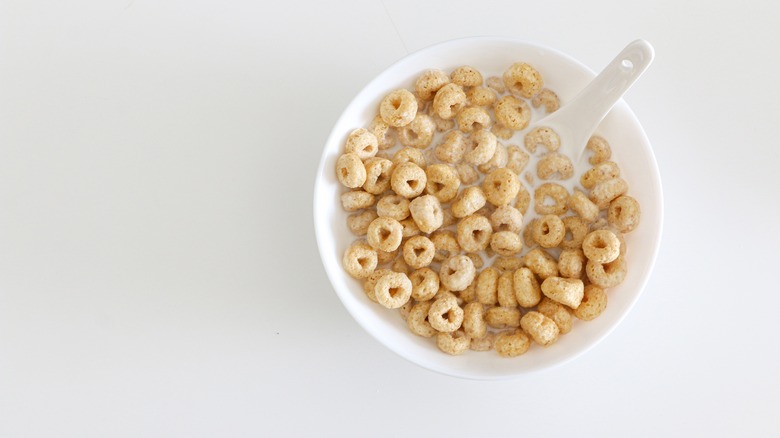Why Some Cereals May Not Be Considered Healthy Anymore By The FDA
There are few breakfasts that are as easy to assemble and eat as a bowl of cereal. Children tend to love the kinds in the likeness of cookies and marshmallows, which, as CBS News notes, has sparked countless lists that inform parents — and other health-minded adults — of the cereal brands with the highest sugar content. The American nutrition rhetoric du jour has long moved on from viewing added sugar as part of a healthy diet, as The American Heart Association did in the 1970s, says The Week. "The less you rely on sugar [...] to prop you up through the day, the more you are able to go into healthy sleep patterns at night," nutritional therapist Charlotte Watts told The Guardian.
Enter "healthy" breakfast cereals, which boast naturally sweet flavors, whole grains, and other buzzwords that make them fly into the carts of busy grocery shoppers. Think Raisin Bran, Honey Nut Cheerios, and Corn Flakes. The FDA approves the healthy labels on these brands, but a proposed rule change at the federal agency might change that.
A proposed set of new rules could remove the 'healthy' label from brands like Special K
After years of enjoying their time in the sun as "healthy" breakfast cereals, brands like Honey Bunches of Oats, Frosted Mini-Wheats, Life, and Special K may be forced to switch out their labels, CNBC reports. That's because late last month, the FDA proposed a new set of rules that would change what constitutes a "healthy" food, refreshing the definition they've had since 1994. The new rules would also yield updates to products' Nutrition Facts labels and the current Dietary Guidelines for Americans.
Per the report, the new rules would be put in place "to better account for how all the nutrients in various food groups contribute and may work synergistically to create healthy dietary patterns and improve health." The report adds that "more than 80% of people in the U.S. aren't eating enough vegetables, fruit and dairy." If the proposal takes effect, the "healthy" label would be cut and pasted from popular breakfast cereal brands to products "that are part of a healthy dietary pattern and recommended by the Dietary Guidelines," such as nuts and seeds, as well as fatty fish.

